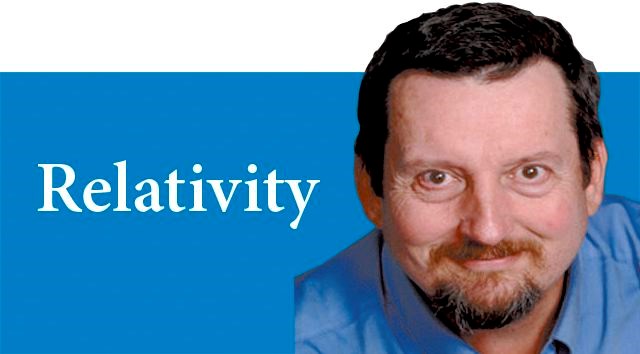Pssst. Hey, buddy, got the time?
A long time ago, in a galaxy far, far away...
Who knows what the future will bring?
Well, it's about time.
We use time references everyday of our lives. We can't avoid it. It is the great leveller. Everything grows older. Time passes like clockwork. The seconds tick away.
Or, at least, physicists once regarded time this way - immutable and unidirectional. To quote Newton, the universe was based on "absolute, true and mathematical time, which of itself, and its own nature, flows equatably without relation to anything external."
More simply, he was claiming time passes regardless of anything else. It was the one solid fact of the universe.
In the late 1800s, scientists began to question this idea. To have an eternal time implied everything in the universe was set against a backdrop which scientists called the aether. But when experiments were devised to look for the aether, nobody could find it.
The most famous of these was the Michelson-Morley experiment which tried to measure the difference in the speed of light when it was travelling with or against the aether instead of across it.
No difference was found. Moving with or against or across the flow of aether had no effect on the measured speed of light. The explanation of this was offered by two other scientists, Lorentz and FitzGerald, who postulated that maybe length and mass were affected by velocity.
Their equations suggested there is a contraction in the distance the light beam had to travel which just offset the time delay that should have been there.
The final blow to absolute time was struck by Albert Einstein who argued if mass and length were variables then maybe time itself was also variable. This is the basis of Einstein's Special Theory of Relativity.
Is time a variable? The answer had to wait until some better clocks could be made since the speeds we can achieve on Earth are minuscule relative to the speed of light. But in 1971, with the aid of four atomic clocks, two scientists, J.C.Hafele and R. Keating, set out to test Einstein's equations.
They loaded up the four clocks on a commercial airliner heading east and flew all the way around the world. And sure enough, when they got back to the U.S. Naval Observatory, the four clocks were, on average, 59 nanoseconds - 59 billionths of a second - slow relative to the clocks which had remained at the Observatory. They then loaded the clocks on westbound flights and flew once more around the world. When they got back, the clocks were, on average, 273 nanoseconds fast.
As noted by Einstein, the difference between the results was a result of the rotation of the Earth producing a time dilation effect.
When this is taken into account, the time dilation, or the slowing down of time because of the speed of the airplane, is exactly what Einstein predicted.
The results have been repeated using sub-atomic particles and large cyclotrons where truly relativistic speeds can be obtained.
All of the experiments performed so far lead to the same conclusion: time is a variable.
Of course, Einstein's theory was predated by science fiction writer, H.G. Wells, who, in The Time Traveller, wrote: "There is no difference between time and any of the three dimensions of space except that our consciousness moves along it."
The notion that time is a variable and linked with the dimensions of space naturally leads to the question of time travel. Is it possible? For Wells, it was a literary trick which allowed him to write a classic story. For Einstein and every other physicist, it is a matter of speculation, possibilities and concern.
Speculation because of the implications of being able to move freely in time. We are all "time travellers" but locked into a one way trip with no chance to change direction or speed.
But what if this wasn't the case? What if time was not linear?
Black holes and tunnels in space-time offer the possibility of being released from linear time.
Step outside of the universe and time suddenly becomes a variable we can manipulate allowing us to move in any direction.
Theory doesn't prevent it but theory also doesn't explain how to make it happen.
The possibilities are endless and that causes concern.
What if a time trip was to alter the time line so Albert Einstein was never born? If he was never born, then he could never have come up with his theories and time travel could never have been invented, so the timeline could not have been altered... such possible paradoxes present the possibility time travel may not be something we want to pursue.
In any case, it is all about time... as in, it is time to stop.



